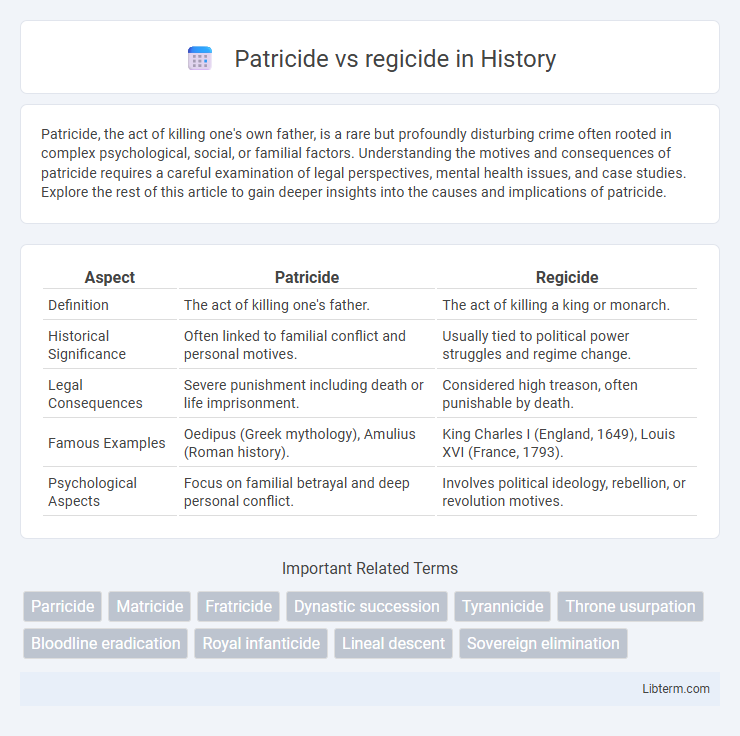Patricide, the act of killing one's own father, is a rare but profoundly disturbing crime often rooted in complex psychological, social, or familial factors. Understanding the motives and consequences of patricide requires a careful examination of legal perspectives, mental health issues, and case studies. Explore the rest of this article to gain deeper insights into the causes and implications of patricide.
Table of Comparison
| Aspect | Patricide | Regicide |
|---|---|---|
| Definition | The act of killing one's father. | The act of killing a king or monarch. |
| Historical Significance | Often linked to familial conflict and personal motives. | Usually tied to political power struggles and regime change. |
| Legal Consequences | Severe punishment including death or life imprisonment. | Considered high treason, often punishable by death. |
| Famous Examples | Oedipus (Greek mythology), Amulius (Roman history). | King Charles I (England, 1649), Louis XVI (France, 1793). |
| Psychological Aspects | Focus on familial betrayal and deep personal conflict. | Involves political ideology, rebellion, or revolution motives. |
Understanding Patricide and Regicide
Patricide refers to the act of killing one's own father, often rooted in familial conflict or psychological trauma, while regicide involves the killing of a reigning monarch, typically driven by political motives or rebellion. Understanding patricide requires an analysis of complex family dynamics and interpersonal violence, whereas regicide demands a focus on historical context, power struggles, and the impact on governance. Both acts, despite their criminal nature, reveal deep insights into human behavior and societal structures.
Historical Origins of Patricide
Patricide, the act of killing one's father, can be traced back to ancient legal and mythological contexts, with early records found in Mesopotamian law codes and Greek tragedies. Unlike regicide, the deliberate killing of a king, patricide often embodied personal familial conflict rather than political rebellion. Historical origins of patricide highlight its role in both societal taboos and narrative explorations of power, authority, and morality within patriarchal structures.
Historical Cases of Regicide
Historical cases of regicide, such as the execution of King Charles I of England in 1649 and the assassination of Tsar Nicholas II of Russia in 1918, highlight political upheaval and the overthrow of monarchies. Regicide involves the deliberate killing of a reigning monarch, often during revolutions or civil wars, distinguishing it sharply from patricide, the act of killing one's father. These events often mark critical turning points in a nation's history, symbolizing the collapse of royal authority and the rise of new governance.
Psychological Motivations Behind Patricide
Patricide, the act of killing one's father, is often driven by complex psychological motivations such as deep-seated resentment, unresolved childhood trauma, or a struggle for power and identity within the family hierarchy. Unlike regicide, which typically stems from political ambition or ideological conflict, patricide is closely tied to intimate familial dynamics and feelings of betrayal or neglect. Understanding these psychological underpinnings provides insight into the emotional turmoil that fuels such extreme acts within the parent-child relationship.
Political and Social Impacts of Regicide
Regicide, the act of killing a reigning monarch, profoundly disrupts political stability by creating power vacuums and triggering succession crises that can lead to civil wars or regime changes. The social impact includes widespread unrest as societies grapple with the legitimacy of new rulers and the breakdown of traditional hierarchies, often fueling revolutionary movements or reinforcing authoritarian control. Unlike patricide, which primarily affects familial dynamics, regicide directly challenges the foundational structures of governance and societal order.
Legal Consequences for Patricide vs Regicide
Patricide, the act of killing one's own father, typically results in severe criminal charges such as first-degree murder, often carrying life imprisonment or capital punishment depending on the jurisdiction. Regicide, the killing of a reigning monarch, historically led to capital punishment and was treated as an act of treason with harsher political and legal repercussions. Modern legal systems still classify patricide under general homicide laws, while regicide remains rare and heavily politicized, often invoking national security laws alongside murder charges.
Cultural Perceptions: Family vs State Betrayal
Patricide, the act of killing one's father, is often viewed through a deeply personal and taboo lens, symbolizing a betrayal of familial trust and natural order within cultural narratives. Regicide, the killing of a reigning monarch, represents a political and social upheaval, embodying a betrayal against the state and its foundational authority. Cultural perceptions distinguish these crimes by the proximity of the relationship and the scope of impact: patricide disrupts intimate family bonds, while regicide challenges established governance and societal stability.
Notorious Patricides in History
Notorious patricides in history include figures such as Kronos in Greek mythology, who famously devoured his children to prevent them from overthrowing him. In real history, the murder of King Charles III of Spain by his son Charles IV's supporters is often discussed as a case veiled in patricidal intrigue. These acts contrast with regicide, which involves the killing of a monarch and often carries distinct political motivations and repercussions.
Famous Regicides and Their Aftermath
Famous regicides like the execution of King Charles I of England in 1649 and the assassination of Tsar Nicholas II of Russia in 1918 illustrate the profound political upheaval and societal transformation that often follow the killing of a monarch. These events typically result in dramatic regime changes, civil wars, or the rise of new political ideologies, significantly altering the course of history within their respective nations. The aftermath of regicide frequently includes power vacuums, shifts in governance structures, and long-lasting national trauma.
Patricide vs Regicide: Comparative Analysis
Patricide, the act of killing one's father, contrasts with regicide, the killing of a reigning monarch, in both motive and societal impact. Patricide often arises from personal or familial conflicts, while regicide typically involves political power struggles or revolution. The legal and cultural repercussions of regicide are historically more severe due to its threat to state stability, whereas patricide is primarily addressed within criminal and family law contexts.
Patricide Infographic

 libterm.com
libterm.com